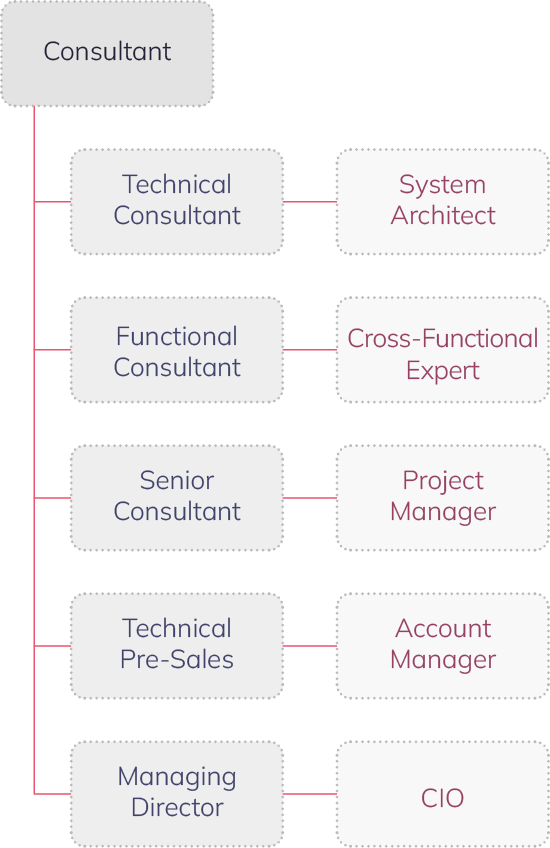NetSuite Consultant
Whatever the NetSuite role, use our guide to benchmark your salary, or to uncover what you should be paying employees in your team.

How much do Consultants make?
Functional/Implementation Consultant
| United States ($) – 130,750 |
| Canada (C$) – 100,250 |
| United Kingdom (£) – 61,250 |
| Australia (AU$) – 122,500 |
| United States ($) – 153,000 |
| Canada (C$) – 121,750 |
| United Kingdom (£) – 75,500 |
| Australia (AU$) – 152,500 |
| United States ($) – 180,250 |
| Canada (C$) – 140,750 |
| United Kingdom (£) – 103,250 |
| Australia (AU$) – 166,250 |
Technical Consultant
| United States ($) – 136,000 |
| Canada (C$) – 109,000 |
| United Kingdom (£) – 60,250 |
| Australia (AU$) – 93,750 |
| United States ($) – 158,500 |
| Canada (C$) – 130,500 |
| United Kingdom (£) – 75,500 |
| Australia (AU$) – 150,000 |
| United States ($) – 186,000 |
| Canada (C$) – 148,250 |
| United Kingdom (£) – 90,750 |
| Australia (AU$) – 158,000 |
Functional/Implementation Consultant
| 0-2 years | 3-6 years | 7-10 years | |
|---|---|---|---|
| United States ($) | |||
| Canada (C$) | |||
| United Kingdom (£) | |||
| Australia (AU$) |
Technical Consultant
| 0-2 years | 3-6 years | 7-10 years | |
|---|---|---|---|
| United States ($) | |||
| Canada (C$) | |||
| United Kingdom (£) | |||
| Australia (AU$) |
of Consultants are satisfied with their job, down from 78% in our last survey
of Consultants are satisfied with their salary, down from 84% in our last survey
Permanent Consultants are working an average of 42 hours per week
Freelance Consultants are working an average of 41 hours per week
What factors impact on your earning potential as a Consultant?
| Satisfied – 90% |
| Neutral – 10% |
| Dissatisfied – 0% |
| Satisfied – 87% |
| Neutral – 13% |
| Dissatisfied – 0% |
| Satisfied – 80% |
| Neutral – 13% |
| Dissatisfied – 6% |
| Satisfied – 75% |
| Neutral – 23% |
| Dissatisfied – 3% |
| Satisfied – 70% |
| Neutral – 30% |
| Dissatisfied – 0% |
| Satisfied – 65% |
| Neutral – 13% |
| Dissatisfied – 23% |
| Satisfied – 27% |
| Neutral – 46% |
| Dissatisfied – 27% |
| Important | Neutral | Unimportant | |
|---|---|---|---|
| Years of technical experience with NetSuite | |||
| Exposure to large projects | |||
| Years of experience in IT/Ops/Finance | |||
| Specific vertical industry experience | |||
| NetSuite certifications | |||
| College/University degree(s) | |||
| Working with AI |
What steps should you take to become a Consultant?
Education
In this year’s survey, 88% of Consultants hold at least a Bachelor’s degree. However, only 50% said a degree is an important factor to work with NetSuite, while 65% consider a degree important in increasing earning potential.
Certification
Almost two-thirds (65%) of Consultants are certified, yet 85% of Consultants believe that certifications help to make you a more valuable professional.
What NetSuite certifications do Consultants hold?
| NetSuite Administrator Certification | 63% |
| NetSuite ERP Consultant Certification | 53% |
| NetSuite Suite Analytics User Certification | 53% |
| NetSuite Financial User Certification | 53% |
| NetSuite SuiteCloud Developer Certification* | 11% |
| NetSuite Application Developer | 11% |
| NetSuite Web Services Developer certifications | 11% |
| Retired NetSuite certifications | 11% |

Roles that can lead on to
becoming a Consultant
Consultants’ career paths come from incredibly varied backgrounds, meaning there’s a good chance it remains a viable career option for you if you’re still looking at your future options within the NetSuite space. Some of the roles where Consultants tend to have a background include:
- Accountant
- Accounts Receivable Clerk
- NetSuite Administrator
What skills and experience should Consultants have?
- Knowledge of NetSuite administration functionality
- Understanding of workflows, searches, and financial reports within NetSuite
- Understanding of NetSuite tools such as SuiteBuilder, SuiteAnalytics, SuiteFlow, SuiteTalk, and SuiteBundler
- Proficient in designing and developing NetSuite customizations
- Knowledge of basic accounting and financial statements
- Experience with full life-cycle implementations
- Ability to communicate complex concepts to stakeholders at all levels
- Strong understanding of business needs and operations
- Great spoken and written communication, as well as presentation skills
- Time management skills
- Ability to organize and prioritize effectively
What are the opportunities for progression?



Functional or Technical Consultant?
While a career as a NetSuite Consultant is appealing to many, there are two paths available that you’ll likely need to decide on quite early.
The two types of roles available will be Technical Consultant and Functional Consultant, each with different responsibilities. An understanding of the processes involved and associated modules is vital whichever you choose to pursue, but the roles themselves differ and it’s important to be aware of this from the outset.
A Technical Consultant, as the name may allude to, is a much more hands on role in terms of customizing and coding, and carrying out more ‘administrative’ type tasks that are involved in an implementation. If tech is your passion and you just want to get your hands dirty, so to speak, then following the pathway to becoming a Technical Consultant is going to be best suited to your strengths.
For those with a more strategic eye when it comes to how NetSuite is used within an organization, then there’s a good chance that working as a Functional Consultant is going to be a better fit. A Functional Consultant is responsible for matching a NetSuite customer’s business requirements with the best products to match, mapping out solutions that ensure optimum performance rates. This requires an in-depth understanding of business functions, including accounting and sales, to ensure that you’re configuring a NetSuite solution that truly adds business value.
Although the two roles differ on a day-to-day basis, their paths will still cross. In fact, they’ll often work closely together, with a Functional Consultant offering ways to increase efficiency and functionality based on their own findings, with a Technical Consultant then implementing those solutions.
So, if you have stakeholder management experience and an ability to problem solve and communicate, then you’re likely to be better suited to pursuing the role of a Functional Consultant. If your passion is purely for tech, then a Technical Consultant is the career path for you.
Our key findings report contains highlights from this year’s Careers and Hiring Guide, plus our salary tables allow you to compare your salary or benchmark your teams’ salaries no matter their role in the NetSuite ecosystem.





